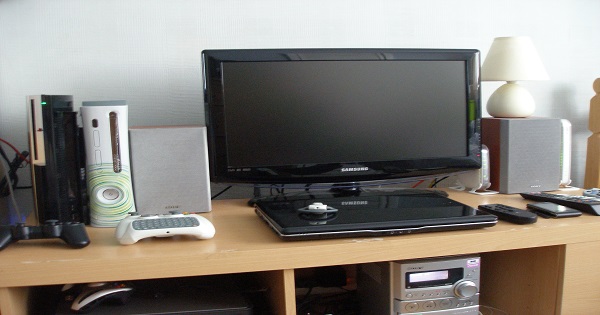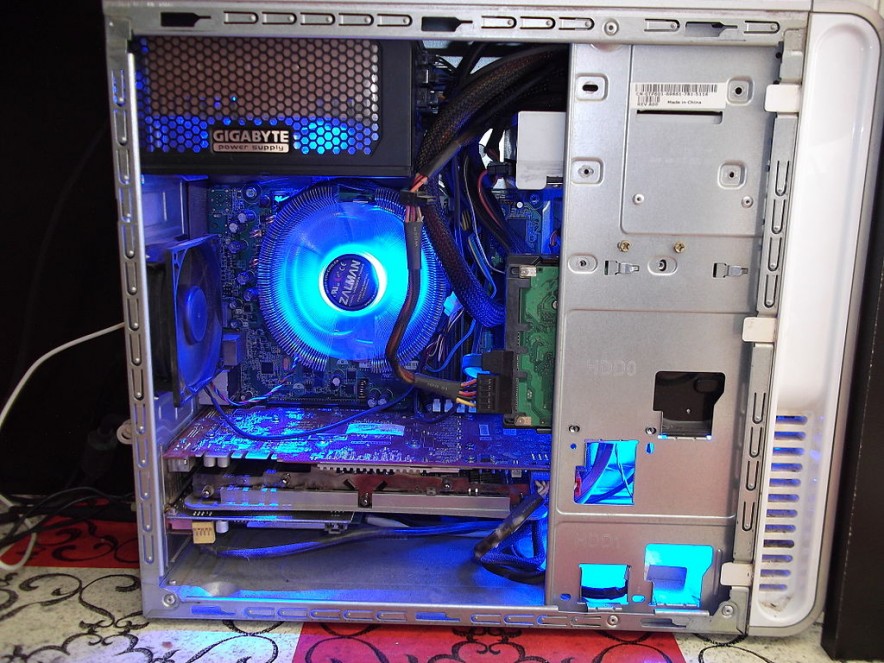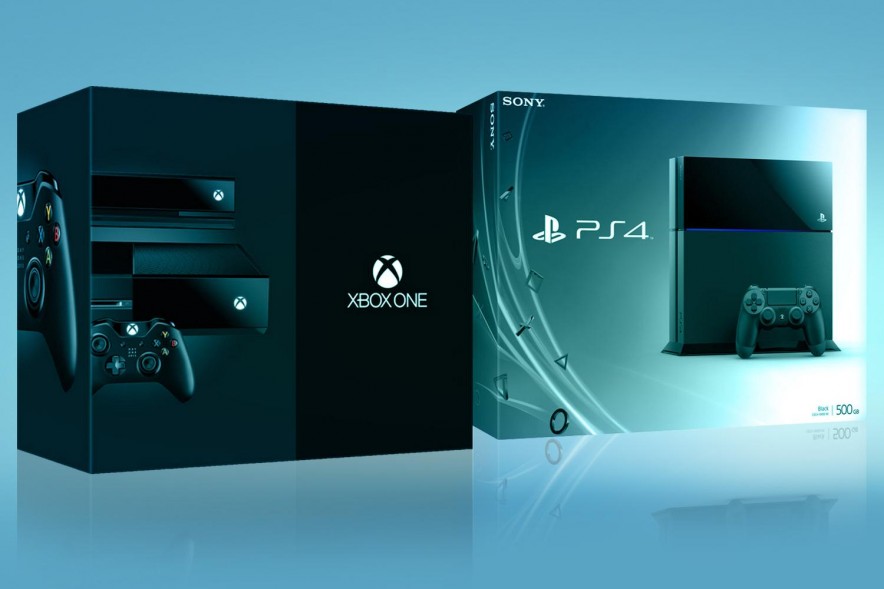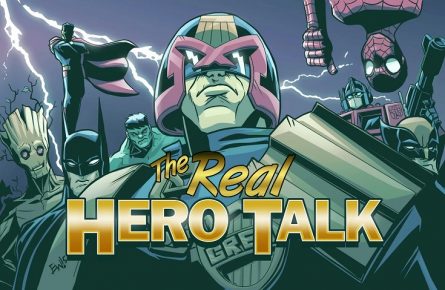Consoles vs. PCs: A Foot in Both Camps

(Or: How I Learned to Stop Worrying and Just Enjoy Gaming)

In the world of gaming there are those that are not merely enthusiastic about the pastime itself, but unflinchingly loyal to the hardware on which they partake in that entertainment. The most extreme factions, the familiar console fan-boys and “PC Master Race” snobs go one step further and seek to decry or belittle devotees of platforms other than their personal totem. These glassy-eyed zealots define themselves as much by opposition to alternate forms of gaming (eg. “casuals”) as they do by their support of a supposedly superior system.
Not everyone who would like a wider sampling is fortunate enough situationally or economically to have access to all the different gaming systems available. Human nature is such that individuals will often modify their attitudes to justify their investment in an expensive purchase. This phenomenon could certainly lead to a more rigid insistence on backing the horse that one has chosen, so to speak.
From my own observations, however, I find the majority of gamers to be reasonably open minded people and not prejudiced enough to rule out potential new gaming horizons on the basis of arbitrary technological or brand allegiances. Many of us, like myself, have had a foot in both the console and PC camps for much of their life and see this as a natural state of existence. Admittedly, over the course of my life to date, there have been times when I felt differently, but with age and experience, I’ve found that there is no good reason why I can’t or shouldn’t enjoy both.
I was a console gamer first, graced with both a ColecoVision and an Atari 2600 at six years old. If I even yet understood the concept of a home computer at the stage it wouldn’t have occurred to me that such a thing would be capable of playing games. As it turned out, our first computer, an Atari 800XL appeared in the house not long before I had turned eight. Given a significant number of the titles on that black and ivory coloured beast were cartridge-based, from my perspective the lines between the systems I owned were blurred from the start. Even the joysticks were partially cross-compatible, nearly a decade before I’d ever heard what a “driver” was.
Yet even as a child, some of the differences between computers and the consoles were clearly apparent. Games on the 800XL (and the Commodore 64s that some of my friends owned) were capable of greater complexity, variation and duration. Occasionally, one had to enter basic commands to start up a piece of software. Load times and listening to the grinding of a disk drive were par for the course. I noticed that the consoles often sat visibly, if not exactly proudly, in the main entertaining areas of homes whereas the computers (as in the case of my own) were usually tucked away in a basement corner or an office. At its core, however, both types of devices were still all about the games. This was years before I owned a computer that performed double-duty as a word-processor or spreadsheet maker – that such a machine could be used for anything productive in my life didn’t enter my mind.
Of course, as life went on, into the 90s and beyond, increasingly computers did come to represent far more than just entertainment. The demands of schooling and eventually jobs made me look at my PC differently. I know I’m not alone in the experience of getting home from a long day in from of a desktop, only to glance over at my own computer and be repulsed by the thought of assuming the familiar position in front of the keyboard. Unless you work in software development for the gaming industry, a console is purely about fun: an untainted experience that can and does feel essentially the same in adulthood as it did in childhood.
I’ve also been guilty of looking down my nose at consoles at certain chapters of my personal history. The release of Call of Duty 3 was not my proudest moment. The decision to make the game a console exclusive pissed me off to no end. I had played and loved the first two entries in the series on PC and felt that was where the franchise belonged. At that time, even the thought of playing a first-person shooter on a console would have filled me with disgust. Looking back nearly 10 years later (when I finally got to play the game I swore I never would touch), it seems ridiculous that I got so fired up on the subject. I’ve played more FPS games on consoles than I can count in the interim.
So as someone whose perspectives have shifted and grown more nuanced over time, what can I say are the main advantages and disadvantages of each platform?:

PCs
Depending on your level of tech savviness, one can elect to buy an entirely pre-built PC or design and build one from scratch. There are options for the budget conscious and those looking for space-aged super-powered rigs that can handle any game, fully maxed. Of course you need to have a certain level of knowledge to pull off a DIY system, and not everyone has the patience. I personally go through phases where I get exhausted with what I call the “upgrade bug”. PC’s can be mysterious at times and you might find yourself browsing the internet for a fix or encounter a problem for which their initially seems to be no solution. Sometimes errors occur and then never happen again. With so many different parts from so many different manufacturers and ever changing operating systems, patches and drivers, PC’s are never a consistent, static experience. The game library, however, is huge, varied, ever growing and, generally, except with particularly old games, backward compatibility is rarely an issue. Because the PC user-base is so huge, developers will very often develop a PC port of a game, even if it may be later in the life cycle. One needs to bear in mind that the quality of these ports can vary wildly. To be a PC user is to be patient that the bug of today will be patched tomorrow. Sure, console games can deal with bugs and patches as well, but the cycle is far more core to the PC experience. The flexibility I touched on early also extends to mods. That game you love may have an entire scene dedicated to created new and strange improvements, changes and gameplay styles of an existing game – sometimes for free. Truly the PC space is a wide frontier for those willing to or interested in exploring…but patience is key.
Consoles
Setting aside all the superfluous fluff, consoles are at their core, systems designed to play games. They’re designed specifically for that purpose and your experience of a game on one console will largely be similar to that on another. Consistency means, typically, fewer bugs. If everything works the way it should, you pop the disc in and press a button and within a reasonable amount of time, you’re playing. There is rarely if ever any fine-print, or any need to read system requirements. You buy the game with the right logo/system on the box and it just works. For those that care about physical media in an age of digital downloads, consoles will often have a hard copy available for purchase where on the PC version may not be the cast. Controllers are also a selling point – in fact many games like me have given up on purpose-built PC controllers altogether and simply use any of the more popular console gamepads on the market when playing on a computer. There is a reason that, for example, the twin-stick/Dual Shock design is so widespread: because it works. Then of course, there are the exclusives. Though it can be said that today, the PC market gets perhaps more ports than ever, there are still big franchises (eg. Halo, Metal Gear) that rarely, if ever, appear anywhere but on consoles. In the case of Nintendo, you either own a console or a handheld, or you’re not playing Nintendo games. It has also never been easier to hook up a computer to a TV, but the experience is rarely as straight-forward or as easy as it is with a console. I like my PC and all but it’s big, boxy and noisy and I don’t want it anywhere near my entertainment unit. Sometimes you want something small, compact and capable that can just run the game, no questions asked. There is something to be said for convenience, even if you get that at the expense of raw power, flexibility, expandability, backwards compatibility and a narrower library of games.

Of course, there are some advantages and disadvantages to each, and I can certainly appreciate the arguments for and against. The truth is this: you’re never going to be in a better position than when you have access to both worlds. No gaming PC? Sorry, you’re going to miss out on insane sales on distribution platforms like Steam & GoG, for prices you’ll never dream of seeing on a console storefront. Are cutting edge graphic requirements pushing your desktop past its limits? Too bad you don’t have the option of playing the game on a current console that will handle it no problem without dropping hundreds of dollars on RAM, CUP or video-card upgrades.
Currently I have a PC that is over three years old and well behind the curve in terms of performance. It’ll play older titles or indie-games with modest system requirements without much worry, but anything new or AAA and you can forget it. Fortunately I have a console sitting not too far away that can manage the higher end stuff just fine. Down the line when I inevitably replace my PC with a better rig, I imagine the opposite scenario might be the case. I might not have the newest gen console of the day so my PC is where I’ll turn for the latest releases. Having a foot in both camps is practical a good way to stay future proof.
Irrational devotion to this manufacturer or that isn’t getting you anywhere. If anything, you’re missing out on so many gaming opportunities on the other side of the fence. Your financial advisor would say diversify, don’t put all your eggs into one basket. Gaming should be no different. There are reasonable PC options even for the budget conscious – you don’t need the best model available, just enough to suit your specific needs. On the console side, re-consider the idea of being an early adopter. Launch libraries are paltry these days and prices can only go down. Think about used options too.
Take off the blinders, look at the wider gaming world available to you, and stop insisting on backing just one horse. Enjoy!








Excellent read my friend.
I honestly think most of these “fanboys” or those that stick to one camp and defend it as if they were a part of a warring nation are of the younger generation of gaming, and yes, I mean younger than myself. I don’t know why that is necessarily but I’m sure it has something to do with the fact that the Internet was around and thriving when they were brought into this world. I don’t know anyone my age or older that acts this way whole.